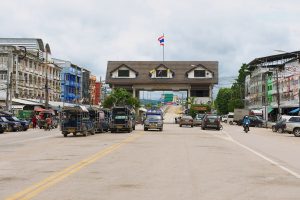Thailand is prepared to accept up to 100,000 people from the conflict-torn Karen State in neighboring Myanmar, its foreign minister said yesterday, as ethnic Karen rebels closed in on the town of Myawaddy on the Thai border.
Late last week, the Karen National Union (KNU) announced that it and allied anti-regime militias had overrun a military base in the town of Thanganyinaung, about 10 kilometers west of Myawaddy. In doing so, it accepted the surrender of 477 military personnel and 140 family members. The KNU said that it was engaging in negotiations with the garrison stationed outside Myawaddy itself, whose surrender now appears to be a matter of time.
The fall of the town, which sits across the Moei River from the Thai town of Mae Sot, would be a significant victory for both the KNU and the movement seeking the overthrow of the military administration that seized power in a coup in February 2021. Myawaddy is the third-busiest border crossing in Myanmar and the most important of the six official crossings along the 2,400-kilometer border with Thailand.
As such, the success of the KNU’s offensive has created complications for the Thai government, given the possibility of a large outflux of refugees from Myawaddy township and the aerial bombing raids by the military junta. In a press conference yesterday, Foreign Minister Parnpree Bahiddha-Nukara said that there was not yet any “mass evacuation” of populations from Karen State, the country was ready for the conflict to spill across the border.
“We have prepared for a while and we can accommodate about 100,000 people in Thailand’s safe area temporarily,” he told reporters, according to the AFP news agency. He added that the Mae Sot-Myawaddy border remained open, and that trade continued to flow – although the KNU’s dry season offensive has seen trade decline by around a third over the past year.
Parnpree’s comments came on the same day as Prime Minister Srettha Thavisin presided over a special security meeting intended to address the security implications of the fighting in Karen State. The Thai leader pledged to set up a working committee, led by Parnpree and including a representative of the National Security Council, to oversee those affected by the conflict on Thailand’s border. “Thailand is ready to coordinate and promote cooperation among all sectors to achieve peace and stability in Myanmar as soon as possible,” he wrote in a post on X (formerly Twitter).
In yesterday’s press conference, Parnpree also addressed the Myanmar charter flight that arrived in Mae Sot on Sunday night, supposedly to “transport passengers and cargo” back to Yangon. On Monday, the Thai Foreign Ministry confirmed media reports that the Myanmar junta had requested permission to land three special charter flights in Mae Sot. It said that the first arrived on Sunday night, but departed without picking up any passengers. The second and third flights were subsequently canceled.
The foreign minister said that the Myanmar Airways ATR 72-600 that arrived and then returned to Myanmar on Sunday night was only carrying “state documents,” and there were no officials or weapons on board, The Nation reported. Parnpree also dismissed rumors that bags of cash had been smuggled into the country from Myanmar.
He said that the fact that no passengers boarded the plane presumably stemmed from the fact that negotiations between the Myanmar junta and the KNU over the fate of the surrendered personnel remain ongoing.
Thailand has long been forced to deal with the backwash from the unresolved conflicts in Myanmar. Since the 1980s, it has permitted tens of thousands fleeing Myanmar to settle in informal but now basically permanent refugee settlements that dot the border. That said, the impending KNU seizure of an important trade artery and possible junta air force attacks, have inexorably raised questions about the Thai government’s policy toward the conflict in Myanmar.
So far there has been no sign of a significant shift. In an interview with Reuters on Sunday, Srettha said that it was a good time to open talks with the Myanmar military – pretty much the approach that the Thai government has taken since the coup of 2021, and the basic approach of the Association of Southeast Asian Nations (ASEAN)’s stagnating Five-Point Consensus peace plan.
“The current regime is starting to lose some strength,” Srettha told the news agency, “but even if they are losing, they have the power, they have the weapons.” He added, “Maybe it’s time to reach out and make a deal.”

































